|
|
Posted 7/1/2016 (link)
 The start of a new month brings a plethora of newly-added recordings from living legend John Ashbery.
Starting with the most recent we'll work in reverse-chronological order: from April 1, 2015, we have Ashbery being interviewed for the Poetry podcast and reading "The Mauve Notebook" in both raw and finished formats. Similar recordings (both raw and finished) exist for Ashbery's February 19, 2014 appearance on The New Yorker's poetry podcast, where he's interviewed by Paul Muldoon and reads his own "Gravy for Prisoners" along with Charles Simic's "The Lunatic." Then, from March 27, 2012, there's a lengthy interview with Arlo Quint and Will Edmiston as part of the Poetry Project's oral history initiative.
We jump back quite a bit for our next recording — a September 12, 1990 reading and colloquium for the Modern Languages Auditorium at the University of Arizona (which includes "Hotel Lautreamont," "From Palookaville," "Notes from the Air," and "Korean Soap Opera," among other titles) — and farther still for the one that follows it: an April 19, 1975 reading at the Cambridge Poetry Festival that includes favorites like "Thoughts of a Young Girl," "Soonest Mended," "Farm Implements and Rutabagas in a Landscape," "And Ut Pictura Poesis Is Her Name," and "Daffy Duck in Hollywood."
Our last two recordings are an April 3, 1970 reading at the New York Studio School and a November 18, 1966 reading at the University of Buffalo that showcases selections from from The Tennis Court Oath, The Double Dream of Spring, Rivers and Mountains, and Some Trees.
As impressive as these new recordings are, they're only the tiniest fraction of what you'll find on our encyclopedic John Ashbery author page. Click the individual links above to start exploring.
Posted 7/5/2016 (link)
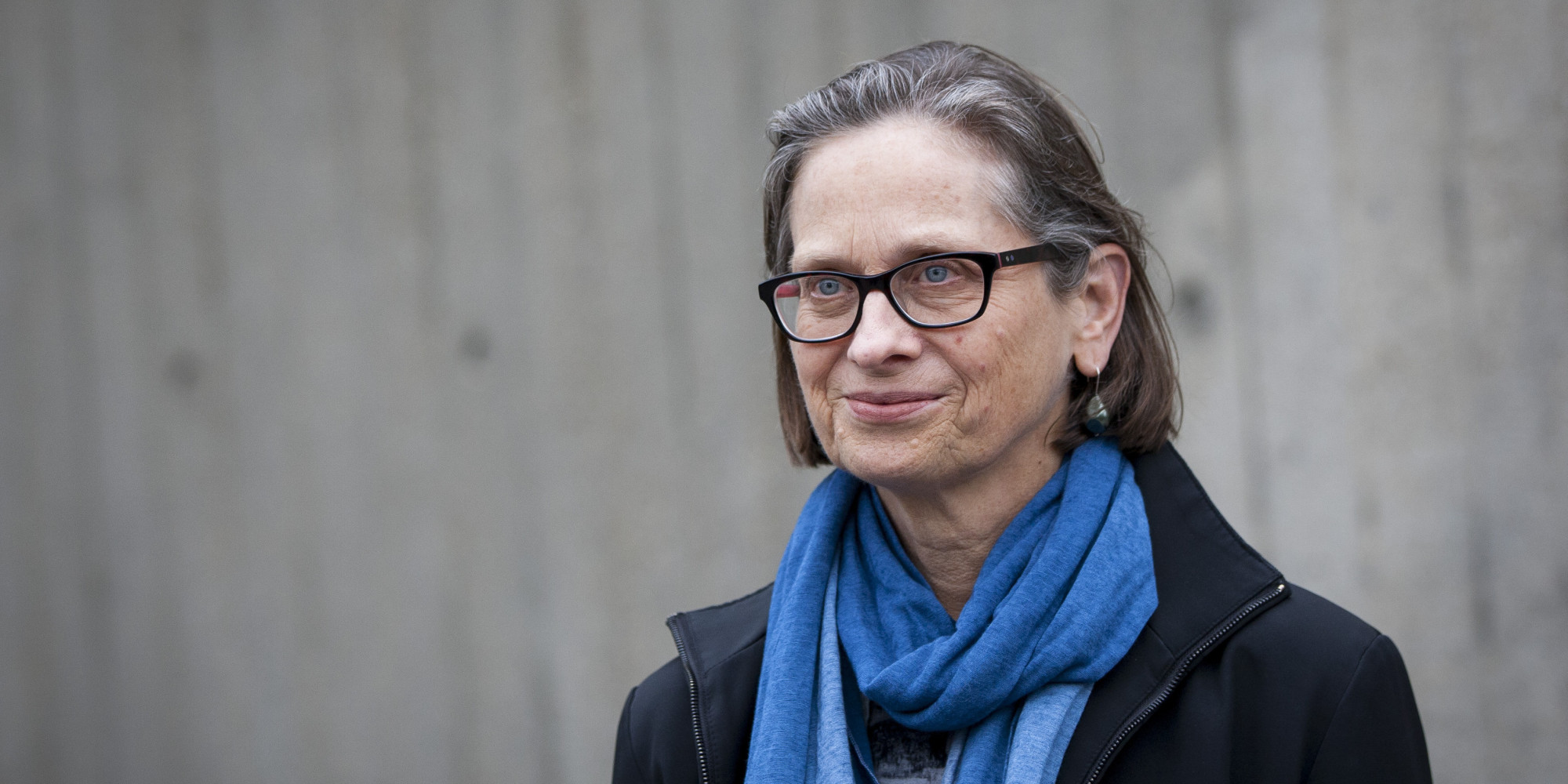 We'll shift gears today from poetry to fiction, with a recently-segmented reading from Lydia Davis — the second event in the annual Bob Lucid Memorial Program in Fiction — recorded at our own Kelly Writers House on April 7, 2010. This program honors Robert "Bob" Lucid, "who taught at Penn for thirty-two years, from 1964 until his retirement in 1996, and whose visionary spirit and infectious enthusiasm infused the Writers House from its beginning."
Her hour-long set consists of eighteen short prose pieces, including "French Lesson One: Le Meurtre," "Coachman and the Worm," "The Sentence and the Young Man," "The Dog Hair," "Sitting with my Little Friend," "Housekeeping Observation," and "The Lanugage Use of the Telephone Company," among others. That's followed by a fifteen-minute interview, also split into individual tracks, including discussions of her favorite Proust, writer's block, dreams, the use of cows in her writing, and the lessons she wishes to impart to her students.
Davis' PennSound author page hosts recordings as far back as 1983, including two earlier appearances at UPenn, numerous Segue Series readings, and appearances on Cross Cultural Poetics.
Posted 7/7/2016 (link)
 Back in April we announced Charles Bernstein's Close Listening program featuring Patricia Spears Jones had been posted. That show recently went live on the Clocktower website and in conjunction with that rebroadcast, we've got several recordings from Jones that have been segmented into individual tracks.
The first of these is the conversation portion of the Close Listening program, which has been broken up into thematic segments from "how she selects and organizes her poetry" to "the role of her readers in her poetry." Her Kelly Writers House reading from that day (April 21, 2016) is also now available as separate MP3s, including the titles "A Desire for Underdevelopment," "Two Deaths, Two Wakes, Two Open Caskets," "Why I Left the Country," "The Perfect Lipstick," and "Etta James at the Audubon Ballroom."
Moving backwards, we also have a pair of readings from 2007. The earlier of these is a Segue Series event at the Bowery Poetry Club from February 24th, while the other is a Belladonna* reading from March 13th. While one might expect plenty of overlap between these adjacent readings, Jones carefully chose her setlists with only a few titles in common. Among the poems read, we find "What is Sadder than a Train Standing in the Rain?," "What I Will Miss is Kissing in Cabs," "Why Silence is Like a Volcano," "Ermine," "The Village Sparkles," "Before I Fell in Love," "Bullocks," and "Coriander."
Posted 7/11/2016 (link)
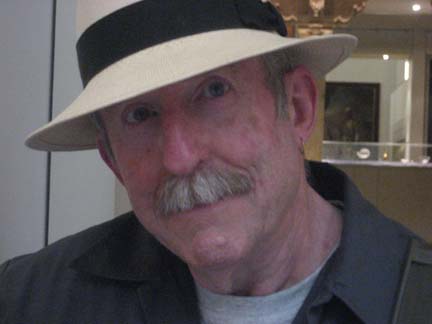 Thanks to the efforts of George Drury, we're able to share this lovely hour-long studio recording of Tom Raworth, produced by Drury and Lois Baum in Chicago on March 8, 1989 and subsequently aired on 98.7 WFMT-FM, where Drury served as Spoken Arts Curator.
The setlist here is drawn largely from Tottering State: Selected and New Poems 1963–1983, first published by The Figures in 1984, and subsequently issued in expanded editions by Paladin Books in 1988 and O Books in 2000. Earlier this year Maya Weeks praised this volume for its "expansive geography" on the Litmus Press Tumblr, framing her observations through her own writing practice: "One of the first questions I often ask myself when I am writing is who I'm doing it for," she notes, observing that in Tottering State Raworth's "speaker seems to be doing it for everyone" via "a broad smattering of languages and geographic references from Reykjavik to Nahuatl [that] activate the broad reach of the text." In Weeks' estimation, "Raworth is encouraging to open up to our surroundings. To look out the window, shrouded as it might be in plastic, to feel through shadows, and see where we are. In this way, the poems are a net for catching sensation."
See whether you experience the same sensations by clicking the title above. You'll find this and many more recordings on our Tom Raworth author page.
Posted 7/12/2016 (link)
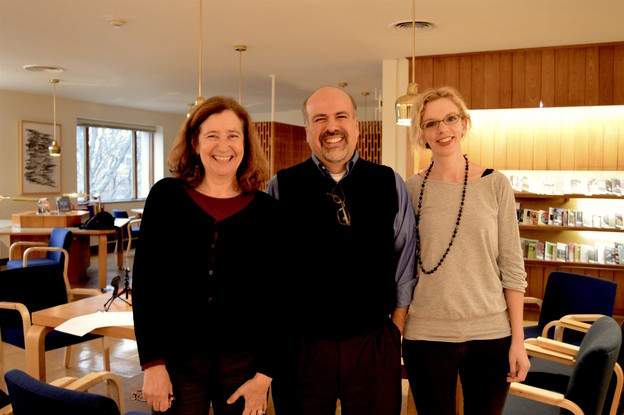 Today we released the newest installment in the PoemTalk Podcast series — its one hundred and second episode altogether — which focuses on Robert Lowell's poem "Skunk Hour." The panel joining host Al Filreis for this discussion in Harvard's Woodberry Poetry Room was (from left to right, at left) Lisa New, Rafael Campo, and Christina Davis.
Filreis' introduction on the PoemTalk blog starts with some context for the poem: "Probably Lowell's most well-known poem, it was placed last in Life Studies (1959) but had been written first — and can be said to have inaugurated Lowell's 'looser' style, associated with his so-called 'confessional' mode. When Lowell began composing 'Skunk Hour,' he later recalled, 'I felt that most of what I knew about writing was a hindrance.'" "Our conversation is taken up by the many conflicting aspects of that perceived hindrance," he continues, "And on top of those there are, of course, the hindrances put up by the new, allegedly freeing style itself." You can read more on Jacket2.
PoemTalk is a co-production of PennSound, the Kelly Writers House, Jacket2 and the Poetry Foundation. If you're interested in more information on the series or want to hear our archives of previous episodes, please visit the PoemTalk blog, and don't forget that you can subscribe to the series through the iTunes music store.
Posted 7/18/2016 (link)
 Last week, when we announced our newly-added 1989 studio recording of Tom Raworth produced by Drury and Lois Baum in Chicago, we briefly mentioned the wealth of recordings available on our Raworth author page. Well today we're back to highlight a number of recordings from there that are now available as individual MP3 tracks.
Altogether there are five recordings that have been segmented. The earliest of these is an April 15, 1982 reading at SUNY-Buffalo introduced by Robert Creeley. It's a long reading consisting of several long pieces, among them "Face" (broken into its three subparts), "Writing," and parts one and two of "Catacaustic." Next up is Raworth's March 1, 1985 reading at the New College, which, more characteristically, squeezes thirty-six brief titles into a thirty-three minute set. That's followed by a March 4, 1988 reading at Buffalo's Allentown Community Center that mixes shorter pieces ("Waiting," "Situations," "The West") with longer ones ("Six Days," "New Moon"), concluding with a twenty-seven minute rendition of the sonnet sequence "Sentenced to Death."
From there, we jump forward to 2001 for a pair of recordings, starting in the springtime with a short Segue Series reading at Double Happiness on March 10th featuring ten poems along with opening and closing comments. Raworth turned in another brief set at Buffalo's Steel Bar on October 31st, that included "Intellectual Compost 3 and 4," "Sixty Words I've Never Used Before," "No Hard Feelings," "Ingot We Trust," "Looking for Language," and "Drinking Electricity."
Click on the individual links above to be taken directly to those readings, or click here to browse our Raworth author page at your leisure. (photograph © 2003 by Gloria Graham)
Posted 7/20/2016 (link)
 Our latest addition to our site isn't just new to the archive, but also pretty recent in and of itself.
This reading by Robert Grenier and conversation between the poet and Etel Adnan — recorded on June 1st of this year at the Serpentine Sackler Gallery in London, England — served as the inaugural event for Etel Adnan: the Weight of the World. As the curators note, this is the "first solo exhibition in a UK public institution" for the Lebanon-born painter, essayist, and poet, which brings together "work from across her career and including paintings, drawings, poetry, film and tapestry." It will run through September 11th. More information about this event, as well as a number of wonderful photos, can be found here.
In sharing news of this video being posted, our own Charles Bernstein also noted "Bilder Lessen," Hans Ulrich Obrist's recent piece on Grenier in Das Magazine, along with Paul Stephens' recent piece in Art in America on the poet.
Posted 7/21/2016 (link)
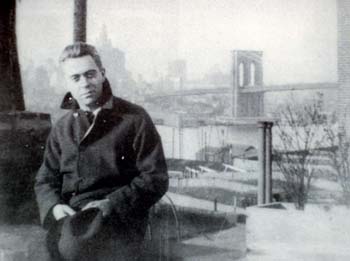 Iconic poet Hart Crane was born one hundred and seventeen years ago, and though his life was tragically short he left behind an influential body of work that continues to captivate readers to this day.
To mark the occasion we're pointing readers towards PennSound's Hart Crane author page. While it's not exactly comprehensive, it does offer up a few worthwhile resources and give you a chance to reflect on Crane's life and work. The main attraction here is a January 24, 2007 event at our own Kelly Writers House commemorating the publication of the Library of America's Complete Poems and Selected Letters (edited by Langdon Hammer), which was co-sponsored by the Library of America, the Poetry Society of America, Temple-Penn Poetics, UPenn's Creative Writing Program, and the Center for Programs in Contemporary Writing. After introductory comments by Charles Bernstein there are talks by Brian Reed, author of Hart Crane: After his Lights and Samuel R. Delaney, followed by a half-hour discussion of Crane's legacy that also featured Rob Casper, Programs Director of the Poetry Society of America. Additionally, via the website Brain Pickings, we have links to Tennessee Williams reading two of Crane's poems, "The Broken Tower" and "The Hurricane."
To listen to these recordings, click the title above.
Posted 7/25/2016 (link)
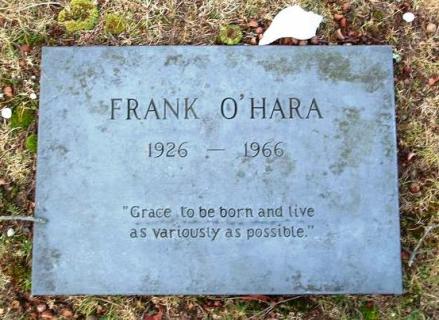 Today marks the 50th anniversary of a tragic event that greatly shaped the course of 20th century American poetry: Frank O'Hara's death after being run over by a dune buggy on Fire Island. It's hard to imagine what wondrous work might have emerged had he been allowed to live as full a lifespan as his friends and compatriots, though as key New York School scholar Andrew Epstein points out in a fascinating new piece published on the Poetry Foundation website, that "strange as it may seem now, O'Hara was better known at the time of his death for his work in the art world than as a writer." Nonetheless, as a core figure around whom the New York School's first and second generations buzzed, as well as a lifeline to other vital writers and artists in the city, O'Hara's death created a void that never could be filled.
Though we don't have the honor of being able to present O'Hara's work on our site (you can find some audio the website set up by the O'Hara estate), that doesn't mean that we don't have some interesting materials relating to his life and work. Chief among these is an April 5, 2011 discussion of O'Hara between Ron Padgett and John Ashbery, recorded as part of Harvard's Oral History Initiative, which is presented as both audio and video. Likewise, on our Marjorie Perloff author page, you'll find two radio appearances — the first part of a 2009 Close Listening broadcast, the second from a 1991 A.L. Nielsen — in which she discusses O'Hara's poetry, along with her 1999 Kelly Writers House talk, "Watchman, Spy and Dead Man: Frank O'Hara, Jasper Johns, and John Cage in the Sixties."
Beyond that we have a number of poetic tributes, including Anne Waldman's "A Phonecall from Frank O'Hara" (MP3) and two poems from fervent O'Hara acolyte Ted Berrigan: "Frank O'Hara" (MP3) and "Frank O'Hara's Question from 'Writers and Issues' by John Ashbery" (MP3). There's also Ashbery's "Street Musicians" (MP3; which Epstein argues "can be read as a subtle elegy for O'Hara"). Finally, though we don't have a copy of it in our archives, we can't overlook Allen Ginsberg's paean to the fallen poet, "City Midnight Junk Strains."
Posted 7/27/2016 (link)
 Earlier this spring we were very happy to announce our new Robert Frost author page, made possible by our associate director, Chris Mustazza. That achievement was recently covered by Jeanne Leong of PennNews.
"Robert Frost enthusiasts are familiar with the poet's written work, and perhaps some recordings of his performances, but now they can hear previously unreleased recordings on PennSound, the free, web-based archive offered by the University of Pennsylvania's Center for Programs in Contemporary Writing," she begins. "The recordings, made in 1933 and 1934, were discovered by Penn Ph.D. student Chris Mustazza while working on his dissertation about the history of the practice of recording poets and the birth of the poetry audio archive." The article continues, quoting Mustazza, both in regards to the obscurity of the recordings prior to his discovery of them — "It had just been lying dormant in the archives, totally un-digitized, unbeknownst to most people" — and the unique delights available to listeners of these well-known poems: "As he is speaking the parts of different characters in 'Mending Wall,' he's actually mimicking the dialect of the different characters speaking. You don't get that from the printed page."
You can read the complete article here. Our Robert Frost author page can be found here.
Posted 7/29/2016 (link)
 Last month we announced a new author page for poet Kate Colby, which was home to two readings. We've recently added two more to that page and here are the details on each.
First, we have a pair of poems from an Ugly Duckling Presse podcast from spring 2015 — "I Mean" and "The Longest Division" — which follow a brief introduction. That's followed by a short video from the Litmus Press Spring Book Party in June 2011.
Those tracks join a reading from the Gloucester Writers Center in May 2016 that features her reading from I Mean for nearly an hour and a February 2013 reading from Dia's Readings in Contemporary Poetry series that starts with poems from Beauport before proceeding to a (then-)new long poem entitled "Blue Hole."
You can listen to any and all of these recordings by clicking the title above.
|
PennSound Daily archive
2023
2022
2021
2020
2019
2018
2017
2016
2015
2014
2013
2012
2011
2010
2009
2008
2007
|










